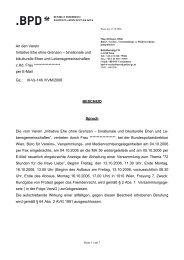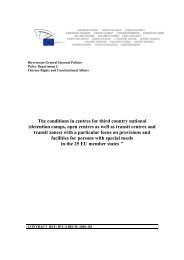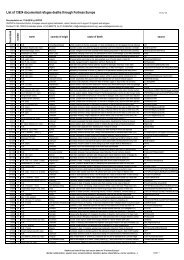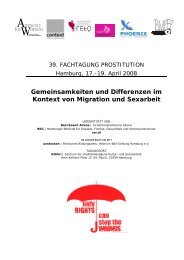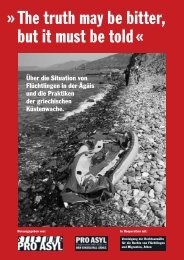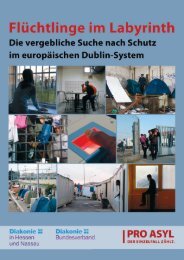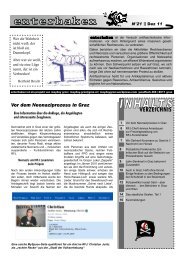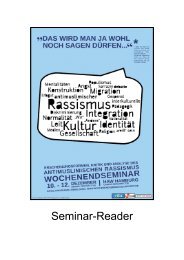Turin's CIE - International University College of Turin
Turin's CIE - International University College of Turin
Turin's CIE - International University College of Turin
Create successful ePaper yourself
Turn your PDF publications into a flip-book with our unique Google optimized e-Paper software.
We are not in a position to draw conclusions about whether this recent 13 June 2012 Court<br />
order has helped to influence the manner in which extension hearings are conducted in <strong>Turin</strong>.<br />
However, in light <strong>of</strong> the current circumstances and past experience, it is legitimate to ask<br />
ourselves what would actually happen if there were Giudici di Pace in <strong>Turin</strong> who continued not<br />
to follow the Corte di Cassazione’s order n. 9596/12 <strong>of</strong> 13 June 2012.<br />
3. GIUDICE DI PACE<br />
Decreto Legislativo 286/1998 gives Giudice di Pace the jurisdiction to conduct validation<br />
hearings and extension hearings. There are no specific provisions under European law that<br />
precisely dictate what level <strong>of</strong> judicial or administrative authority should be used to determine<br />
immigration and administrative detention matters. However, Article 13(1) <strong>of</strong> EU Directive<br />
115/2008/EC does impose the requirement that the decision maker be competent, independent<br />
and impartial.<br />
The choice to give Giudice di Pace jurisdiction over validation and extension hearings in Italy<br />
raises a number <strong>of</strong> concerns. During this research study we consistently received evidence that<br />
called into question whether Giudice di Pace is the appropriate forum for a matter as serious as<br />
immigration detention: “Giudice di Pace has a lack <strong>of</strong> information and a lack <strong>of</strong> training […] and<br />
there is less authority by the Giudice di Pace in comparison to the toga [judges]” (Interview 5).<br />
Another interviewee alleged that Giudici di Pace <strong>of</strong>ten have a superficial attitude: “the implied<br />
understanding, although not expressed, is that you feel “so, here we are to validate” rather than<br />
“we are here to decide the final result”” (Interview 5). All <strong>of</strong> the lawyers who were interviewed<br />
expressed similar criticisms: “This kind <strong>of</strong> judge is completely inadequate and not prepared. In my<br />
opinion we need a proper judge [giudice togato 120 ], one which also has a specific background”<br />
(Interview 8).<br />
In fact, the Giudice di Pace was originally created in 1991 for the purpose <strong>of</strong> settlement<br />
procedures and it can be equated to what some countries would call a Small Claims Tribunal or<br />
a local Civil and Administrative Tribunal. The Giudice di Pace usually decide matters like<br />
neighbourhood disputes, trespass to land, contraventions <strong>of</strong> legislation concerning the<br />
supplying alcohol to drunk people and summary criminal <strong>of</strong>fences. Some interviewees went so<br />
far as to accuse the Giudice di Pace <strong>of</strong> being completely inadequate, incompetent and<br />
unprepared to embark on immigration decisions where a person’s liberty is at stake. For<br />
example, in criminal law the Giudice di Pace does not have the power to sentence a person to<br />
jail. Rather, the Giudice di Pace only has the jurisdiction to consider criminal matters where the<br />
maximum penalty is a pecuniary sentence, such as a fine.<br />
Although <strong>CIE</strong> hearings are administrative procedures, the judges are deciding on personal<br />
freedom. Adopting Giudice di Pace as the forum to approve and extend immigration detention<br />
seems to conflict with the entire basis <strong>of</strong> a legal system that values the notion <strong>of</strong> liberty<br />
throughout its constitutional framework. It would be more in line with the constitutional idea<br />
procedimento di concessione della proroga devono essere applicate le stesse garanzie del contraddittorio,<br />
consistenti nella partecipazione necessaria del difensore e nell'audizione dell'interessato che sono previste<br />
esplicitamente, ai sensi dell'art. 14, quarto comma, del d.lgs. n. 286 del 1998, nel procedimento di convalida<br />
della prima frazione temporale dell'trattenimento”, Corte di Cassazione, Sezoni Unite Civili, ordinanza del 13<br />
giugno 2012, n. 9596. Supreme Court, Unified Civil Section, order <strong>of</strong> 13 June 2012, n. 9596; see also Corte di<br />
Cassazione, Sezone VI Civile, ordinanza del 19 giugno 2012, n. 10055. Supreme Court, Civil Section VI, order<br />
<strong>of</strong> 19 June 2012, n. 10055.<br />
120 A giudice togato is a judge who exercises a judicial function indefinitely and who is appointed via an open<br />
and competitive application process.<br />
66 | P a g e




